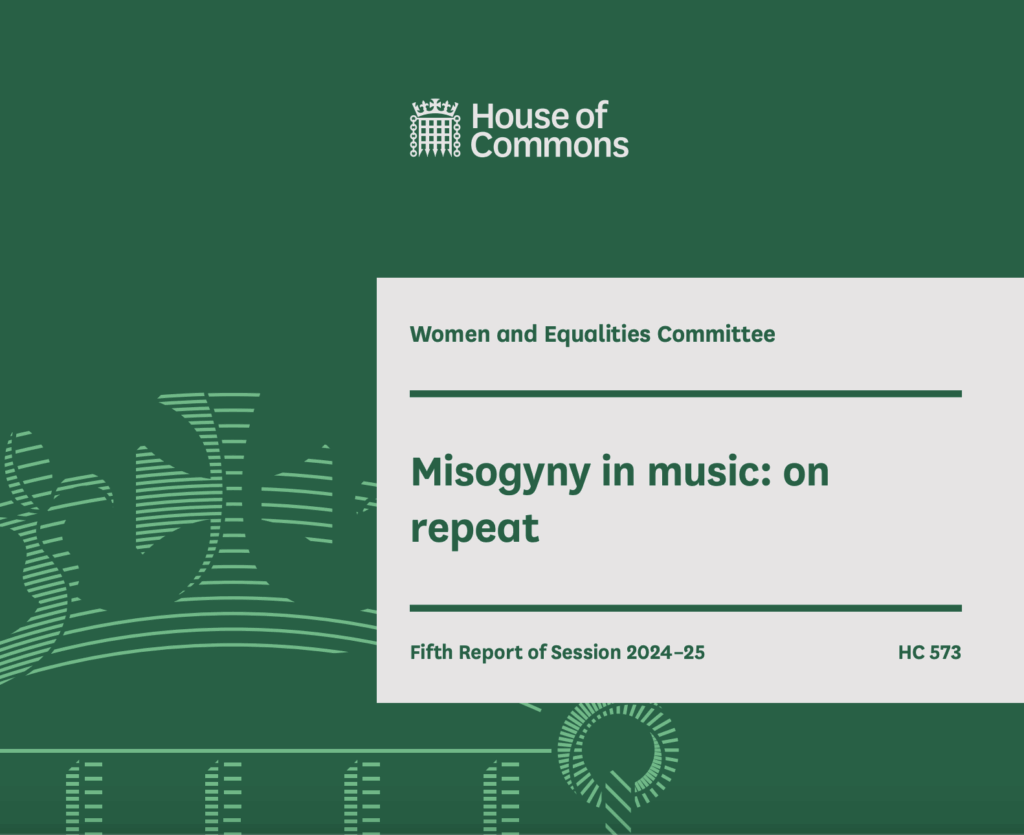Published: June 4, 2025
Committee: Women and Equalities Committee, UK Parliament UK Parliament Committees
This authoritative report resets the bar for equality in the music industry in the UK—or shall we say—highlights just how far we still must go. It follows up on the January 2024 report, revealing that most previously proposed reforms have yet to materialize. Expert testimony and industry data show the same entrenched problems persist—and demand government action.
1. Enduring Misogyny & Freelance Vulnerability
- Culture hasn’t shifted: Women artists face ongoing sexual harassment, discrimination, unequal pay, ageism, and disproportionate childcare burdens.
- Freelancer status disadvantages: Around 70% of music professionals in the UK are freelanced, leaving them outside protections like those in the Equality Act 2010. “Depping,” a common substitute-work practice, further creates loopholes in harassment protections.
2. Legal & Structural Gaps—What Must Change
A. Equality Act & Employment Rights
- Key gap: The Equality Act doesn’t clearly protect freelance musicians from harassment.
- Recommendation: Amend both the Equality Act and Employment Rights Bill to explicitly include freelancers—and add third-party harassment protections.
- Tribunal timing improved, but still…: The window for legal harassment claims will increase from 3 to 6 months under pending legislation.
B. Intersectionality & Section 14 Enforcement
- Deepened risks: Women from Global Majority backgrounds, disabled women, and LGBTQ+ individuals experience particularly severe harassment. Reporting remains low, and mental health outcomes are worsened. UK Parliament Committees+1
- Section 14 of the Equality Act (addressing combined discrimination) still isn’t in force. The Committee urges the Government to implement it by the next parliamentary session.
C. NDAs: Silencing Victims
- Dangerous misuse: NDAs are too often leveraged to suppress victims of sexual misconduct and discrimination, under coercive circumstances.
- Recommendation: Ban NDAs in cases involving sexual misconduct, abuse, bullying, or discrimination—ensuring victims can speak out and seek justice.
D. CIISA—Standards Authority for Creative Sectors
- Need established: The report supports creating a Creative Industries Independent Standards Authority to handle complaints, offer mediation, and enforce ethical behaviors industry-wide.
- Funding issues: Voluntary commitments may fall short. A mandatory levy may be required to ensure CIISA has sustainable backing.
3. Caregivers & Maternity—Unfair Conditions for Creators
- Maternity gaps: Freelance musicians struggle with inadequate maternity support and costly childcare. Maternity Allowance does not match protections offered through Statutory Maternity Pay.
- Recommendation: Align Maternity Allowance with Statutory Maternity Pay to reflect freelancers’ needs and realities.
4. Rising Momentum & Calls for Government Accountability
- Industry voices demand action: Leaders like the Musicians’ Union, ISM, Black Lives in Music, Lucy Cox, Celeste Waite, and Naomi Pohl all emphasize structural change is overdue.
- Political traction: In September 2024, the Labour Party Conference passed a motion calling for full implementation of these recommendations.
Why It Matters to Girl Gang Music
- Visibility & Equity: Women and nonbinary creators—especially freelancers—deserve full legal protection, equitable compensation, and safe work environments.
- Action over Reports: Momentum is building, but nothing changes without government enforcement.
- Policy as Art Support: Structural transformation (rights, parental support, oversight bodies) enables creative freedom and authentic expression.
Quick Summary Table
| Issue | Recommendation |
|---|---|
| Freelance protections | Amend Equality Act & Employment Rights Bill to include freelancers and third-party harassment |
| Tribunal time limits | Extend to 6 months |
| Intersectionality | Enforce Section 14 to address multiple discriminations |
| NDAs | Ban use in cases of harassment, discrimination, or abuse |
| CIISA | Establish and properly fund a Creative Industries Standards body |
| Maternity support | Align Maternity Allowance with Statutory Maternity Pay |
Final Thoughts
Misogyny in Music: On Repeat isn’t just a report—it’s a roadmap. It centers legal reform, industry accountability, and rights for creators who work outside traditional employment structures. For Girl Gang Music’s vibrant community, prioritizing these reforms means real change—not just reports—but safer, fairer spaces for women and nonbinary artists to thrive.
Let me know if you’d like this reformatted into a newsletter or paired with action-toolkits or calls to legislators.

